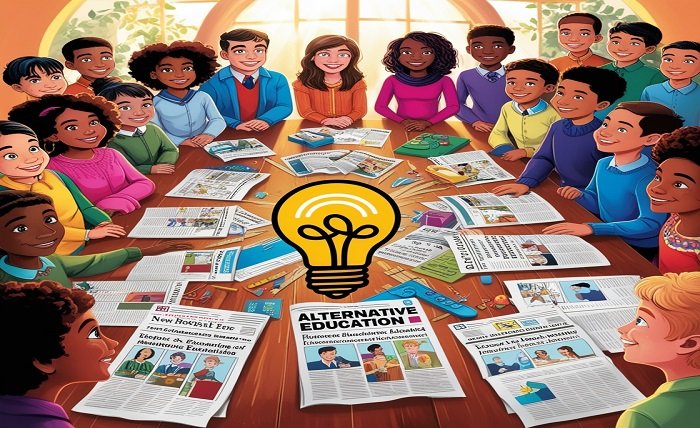As educational media models are promoted and views on education change, the educational environment is also changing. In this blog article, we’ll explore the most recent news, trends, and advancements in alternative education, including homeschooling, unschooling, and creative educational initiatives. We will examine several approaches, their advantages and disadvantages, and the prospects for alternative education in the future.
Comprehending Alternative Education
The term alternative education news describes non-traditional teaching strategies that frequently depart from accepted teaching practices. These can include Waldorf, Montessori, homeschooling, unschooling, and other experiential learning initiatives. The main objective of alternative education is to accommodate different learning requirements and styles while creating an atmosphere that promotes innovation, critical thinking, and individual development.
The Growth of Homeschooling
The COVID-19 epidemic has contributed to the notable increase in homeschooling in recent years. Homeschooling has become popular among parents as a flexible and individualized method of teaching their kids. Recent data shows that the number of homeschooled pupils has grown dramatically, with many families choosing this approach as a result of their discontent with alternative education news.
Advantages of Homeschooling
Tailored Learning: The curriculum can be altered by parents to suit the particular interests and learning style of their children.
Flexible Schedule: Families are free to choose their own hours, which permits travel, discovery, and hands-on education.
Stronger Family Bonds: Through shared learning experiences, homeschooling frequently promotes stronger family ties.
Unschooling: A Method Driven by the Child
A more extreme kind of alternative education news that prioritizes learning led by the kid is unschooling. Without a set curriculum, this method enables kids to pursue their interests. Proponents contend that unschooling encourages a passion of learning and intrinsic motivation.
Essential Elements of Unschooling
Interest-Driven Learning: Kids study things they are enthusiastic about.
Real-World Experiences: Projects, investigation, and life experiences all contribute to learning.
Freedom and Autonomy: Kids are allowed to choose how they want to pursue their education.
Montessori Education: A Comprehensive Method
Dr. Maria Montessori created the Montessori method, which emphasizes collaborative play and hands-on activities for child-centered learning. This method fosters a love of learning, independence, and respect for a child’s natural development.
Characteristics of Montessori Education
Prepared Environment: The purpose of classrooms is to encourage self-reliance and inquiry.
Mixed Age Groups: When kids of various ages learn together, cooperation and mentoring are encouraged.
Hands-on Learning: Interactive, tactile learning resources promote active engagement.
Waldorf Education: Prioritizing Imagination and Creativity
Rudolf Steiner established Waldorf alternative education news, which places a strong emphasis on the arts, imagination, and creativity as means of fostering overall development. This approach cultivates well-rounded people by fusing academics with creative and useful pursuits.
Fundamental Ideas of Waldorf Education
Developmental Stages: The curriculum is in line with children’s normal developmental phases.
Artistic Expression: Through storytelling, music, and art, creativity is incorporated into everyday alternative education news.
Relationship with Nature: A focus on being outside and having a relationship with nature.
New Developments in Alternative Education
As alternative education news expands, new approaches and initiatives are being developed. Organizations and schools are trying out new strategies to interact with students and meet their needs.
Instances of Creative Methods
Project-Based Learning: Students collaborate and develop their problem-solving abilities while working on real-world projects.
Digital Learning Platforms: Flexible, individualized learning experiences are made possible by online resources and courses.
Community-Based Learning: Students can gain practical experience and chances for service-learning through collaborations with nearby groups.
Technology’s Effect on Alternative Education
alternative education news has grown significantly as a result of technology. Families may now more easily access instructional materials and connect with other students thanks to digital platforms, apps, and online tools.
Technology’s advantages in education
Resources Available: Students have online access to a multitude of knowledge and educational resources.
Flexible Learning Environments: Learning can take place anywhere thanks to virtual classrooms and resources.
Opportunities for Collaboration: Homeschooling families and students can work together and support one another through online networks.
Alternative Education’s Obstacles
alternative education news has drawbacks even though it has numerous advantages. To guarantee a great learning experience, parents and educators must overcome a number of challenges.
Typical Obstacles
Socialization: Worries about kids not interacting with their classmates in a social way.
Regulatory Obstacles: Families that homeschool may face difficulties due to differing state laws and regulations.
Resource Availability: The quality of alternative education news may be impacted by restricted access to resources, funds, and assistance.
Summary
With its varied and individualized approaches to instruction, alternative education news is changing the face of education. As the need for these approaches increases, so does the chance for creativity and cooperation between communities, educators, and families. All children can benefit from a more engaging and inclusive learning environment if we embrace alternative schooling.
FAQ
Alternative education: what is it?
The term alternative education news describes non-traditional teaching strategies that deviate from accepted educational norms, such as Waldorf, Montessori, homeschooling, and unschooling.
Why do families decide to homeschool their children?
Because of its flexibility, customized curriculum, and potential to strengthen family ties, homeschooling is a popular choice among families.
Unschooling: What is it?
Without a set curriculum, children learn via their interests and real-world experiences in an approach known as unschooling. Find out more information: pastel para mujer fashion
What distinguishes Montessori education from conventional education?
Montessori education promotes discovery and cooperation among mixed-age groups by emphasizing independent learning, hands-on experience, and a prepared setting.
What difficulties do families have when attending alternative schools?
Socialization issues, understanding rules, and obtaining resources and assistance are typical difficulties.
What effects is technology having on non-traditional education?
Technology makes information accessible, creates adaptable learning settings, and promotes cooperation through online forums.

